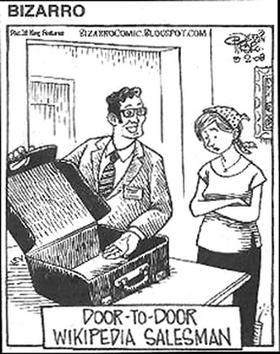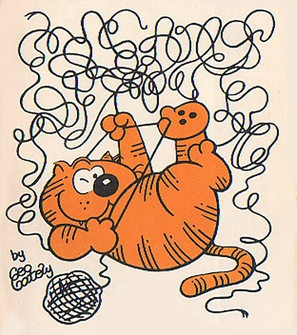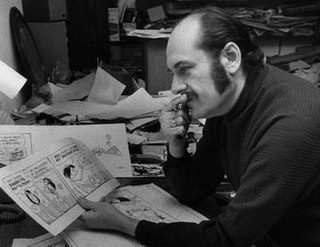
A comic strip is a sequence of cartoons, arranged in interrelated panels to display brief humor or form a narrative, often serialized, with text in balloons and captions. Traditionally, throughout the 20th and into the 21st century, these have been published in newspapers and magazines, with daily horizontal strips printed in black-and-white in newspapers, while Sunday papers offered longer sequences in special color comics sections. With the advent of the internet, online comic strips began to appear as webcomics.

Garfield is an American comic strip created by Jim Davis. Originally published locally as Jon in 1976, then in nationwide syndication from 1978 as Garfield, it chronicles the life of the title character Garfield the cat, his human owner Jon Arbuckle, and Odie the dog. As of 2013, it was syndicated in roughly 2,580 newspapers and journals and held the Guinness World Record for being the world's most widely syndicated comic strip.

Peanuts is a syndicated daily and Sunday American comic strip written and illustrated by Charles M. Schulz. The strip's original run extended from 1950 to 2000, continuing in reruns afterward. Peanuts is among the most popular and influential in the history of comic strips, with 17,897 strips published in all, making it "arguably the longest story ever told by one human being". At the time of Schulz's death in 2000, Peanuts ran in over 2,600 newspapers, with a readership of around 355 million in 75 countries, and was translated into 21 languages. It helped to cement the four-panel gag strip as the standard in the United States, and together with its merchandise earned Schulz more than $1 billion.

Dennis the Menace is a daily syndicated newspaper comic strip originally created, written, and illustrated by Hank Ketcham. The comic strip made its debut on March 12, 1951, in 16 newspapers and was originally distributed by Post-Hall Syndicate. It is now written and drawn by Ketcham's former assistants, Marcus Hamilton, Ron Ferdinand, and son Scott Ketcham, and distributed to at least 1,000 newspapers in 48 countries and in 19 languages by King Features Syndicate. The comic strip usually runs for a single panel on weekdays and a full strip on Sundays.

Patrick McDonnell is a cartoonist, author, and playwright. He is the creator of the daily comic strip Mutts, which follows the adventures of a dog and a cat, that has been syndicated since 1994. Prior to creating Mutts, he was a prolific magazine illustrator, and would frequently include a dog in the backgrounds of his drawings.

Guy Berkeley "Berke" Breathed is an American cartoonist, children's book author, director, and screenwriter, known for his comic strips Bloom County, Outland, and Opus. Bloom County earned Breathed the Pulitzer Prize for Editorial Cartooning in 1987.
Tom the Dancing Bug is a weekly satirical comic strip by cartoonist and political commentator Ruben Bolling that covers mostly US current events from a liberal point of view. Tom the Dancing Bug won the 2002, 2003, 2007, 2008, and 2009 Association of Alternative Newsweeklies Awards for Best Cartoon. The strip was awarded the 2010 Sigma Delta Chi Award for editorial cartooning by the Society of Professional Journalists and best cartoon in the 2018 Robert F. Kennedy Book & Journalism Awards. His work on the strip won Bolling the 2017 Herblock Prize and the 2021 Berryman Award for Editorial Cartoons, and he was a finalist in the Editorial Cartooning category for the 2019 and 2021 Pulitzer Prize.
Randy Glasbergen was an American cartoonist and humorous illustrator best known for three decades of newspaper syndication as well as a freelance career. He produced the syndicated strip The Better Half from 1982 to 2014.

Bizarro is a single-panel cartoon written and drawn by cartoonist Dan Piraro and later by cartoonist Wayne "Wayno" Honath.

Heathcliff is an American comic strip created by George Gately in 1973, featuring the title character, an orange cat. Now written and drawn by Gately's nephew, Peter Gallagher, it is distributed to over 1,000 newspapers by Creators Syndicate, which took over the comic from McNaught Syndicate in 1988.
Frank W. Bolle was an American comic-strip artist, comic book artist and illustrator, best known as the longtime artist of the newspaper strips Winnie Winkle and The Heart of Juliet Jones; for stints on the comic books Tim Holt and Doctor Solar, Man of the Atom; and as an illustrator for the Boy Scouts of America magazine Boys' Life for 18 years. With an unknown writer, he co-created the masked, Old West comic-book heroine the Black Phantom. Bolle sometimes used the pen name FWB and, at least once, F. L. Blake.

Henry is a comic strip created in 1932 by Carl Thomas Anderson. The title character is a young bald boy who is mute. Except a few early episodes, the comic strip character communicates largely but not entirely through pantomime, a situation which changed when Henry moved into comic books. Henry has spoken in at least one Betty Boop cartoon from 1935. In the feature, Betty Boop has a pet shop and Henry speaks to a dog in the window.

Thomas Albert Wilson, was an American cartoonist. Wilson was the creator of the comic strip Ziggy, which he drew from 1971 to 1987. The strip was then continued by his son, Tom Wilson Jr.

Howard Post was an American animator, cartoonist, and comic strip and comic book writer-artist.

GoComics is a website launched in 2005 by the digital entertainment provider Uclick. It was originally created as a distribution portal for comic strips on mobile phones, but in 2006, the site was redesigned and expanded to include online strips and cartoons. GoComics publishes editorial cartoons, mobile content, and daily comics. It is currently owned by Andrews McMeel Universal.

Frank and Ernest is an American comic strip created and illustrated by Bob Thaves and later Tom Thaves. It debuted on November 6, 1972, and has since been published daily in over 1,200 newspapers. The humor of the comic is based almost exclusively on wordplay and puns.

Andrews McMeel Syndication is an American content syndicate which provides syndication in print, online and on mobile devices for a number of lifestyle and opinion columns, comic strips and cartoons and various other content. Some of its best-known products include Dear Abby, Doonesbury, Ziggy, Garfield, Ann Coulter, Richard Roeper and News of the Weird. A subsidiary of Andrews McMeel Universal, it is headquartered in Kansas City, Missouri. It was formed in 2009 and renamed in January 2017.

Jonathan Q. Arbuckle is a fictional character from the Garfield comic strip by Jim Davis. He also appears in the animated television series Garfield and Friends and The Garfield Show, two live-action/CGI feature films, and three fully CGI films.
Donald Duck is an American comic strip by the Walt Disney Company starring Donald Duck, distributed by King Features Syndicate. The first daily Donald Duck strip debuted in American newspapers on February 7, 1938. On December 10, 1939, the strip expanded to a Sunday page as well. Writer Bob Karp and artist Al Taliaferro worked together on the strip for more than 30 years. The strip ended in May 1995.
Hilary B. Price is an American cartoonist. She is known for creating the comic strip Rhymes with Orange, which is published digitally on her website and in over one hundred newspapers across the United States. At the age of 25 she became the youngest cartoonist to ever be nationally syndicated. She won the Silver Reuben for "Best Newspaper Panel Cartoon" from the National Cartoonists Society four times, in 2007 and 2009, 2012 and 2014.















